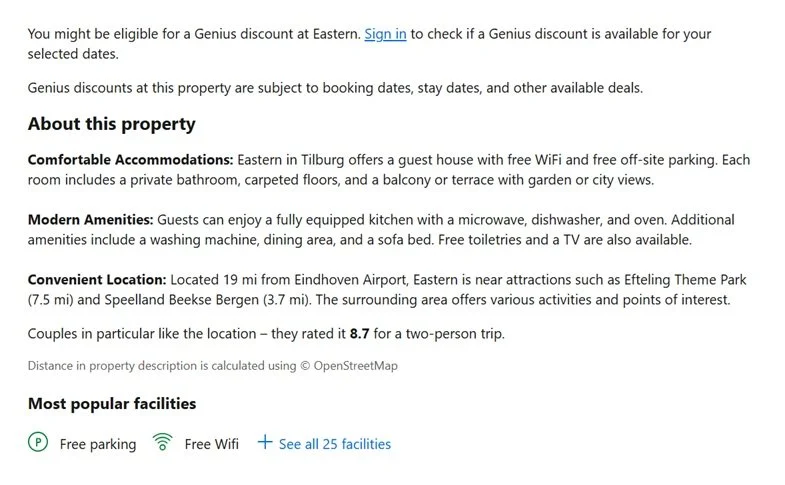Should You Trust Booking.com as a Travel Intermediary?
Short Answer: No
You may recall in my September’s Monthy Mayhem recap that we booked an astoundingly bad “hotel” room in Tilburg when we visited for the city for the recent Ayreon shows. The place was listed under the name “Eastern” on Booking.com, and you can see it here. We were charged 250,20€ for two nights. As someone who cares deeply about customer service and satisfaction, especially with shady corporations, I’m going to talk about this experience, our attempts at resolution, and whether or not Booking.com has your back when they allow private hosts to list accommodations on their site.
Our “deluxe double hotel room”…
Now, at the time of our booking, this place was listed as a “deluxe double hotel room,” though obviously the host has since edited the listing to remove the word “hotel,” which just goes to show how shady the owner is.
When we arrived, what we actually found was a shanty hostel room at best. The entire place was an estimated 10-12m2 atrocity, featuring:
no garbage bins in the room anywhere, including the “kitchen”
a toilet cubicle with less than a square meter’s worth of space to sit in, which looked directly out onto the street (classy)
an incomplete shower cubicle that faced directly into the room (zero privacy), literally with open drywall and exposed innards, all of which was fully visible from the bunk bed, and no ventilation system to speak of
a light-switch that on average took about 40 tries to function, while the shoddily-assembled wall behind it literally caved in when you pressed it
unclean grout and tile in the bathroom and shower cubicle
a sink with open valves that splashed water all over the floor
and, most importantly of all…
A DOOR THAT DID NOT LOCK










For fun, you can still see the listing details here:
There are still lies in there. For example, “carpeted” does not mean “there is a matt on the floor,” it means the floor has a full carpet. There are also quite a few photos on the site, but none of them show the true nature of the room, and that “fully equipped kitchen” was not in the individual rooms, but set up more like a hostel, which incidentally also did not have a garbage bin anywhere to be found. As far as I understand, our room had no access to a terrace or balcony either, though there was an upstairs that we didn’t visit because we were on the ground floor. There was also no way of knowing which room we were getting at the time of booking.
Also, the local handyman did come in and fix the unplugged sink piping, but it was not professionally done… he could have bought a rubber cork, but instead it looked like he stuffed cloth into it and taped or glued it shut.
So, naturally, the first order of business was to contact the host, who simply did not respond. Honestly, we expected that, so we contacted Booking.com to see how they would handle a room that was misrepresented and very literally unsafe (per the locks not working).
Contacting Booking.com for resolution…
At first, Booking.com seemed responsive. They replied relatively quickly and said they would “contact the host” to resolve the issue. Unfortunately, that’s about all they did.
Despite explaining that the host was unresponsive and that the room was unsafe (I’m going to keep bringing this up: the door did not lock), Booking kept assuring us that they were dealing with the issue by trying to contact the host. In other words, they were willing to investigate, but only if the scammer cooperated. And frankly, how realistic is it to think that the host is going to respond if they can get away with it by simply ignoring correspondence?
We were offered a 16€ “goodwill gesture” for our trouble. That’s not a typo. 16€ for two nights in a non-locking box with a open-topped shower that puked humidity into a room that cost us 250€.
Every message we sent was met with the same templated replies, often ignoring our actual questions and requests, and regularly spawning an entirely new email thread… surely their way of breaking the paper trail. It’s also worth noting that our complaint didn’t even get through to Booking.com when we had links to the Drive folder with our photos and videos in it, without notifying us that the messages were not getting through or why… that took digging of our own to figure out. This AI support assistant conveniently weeds out people’s evidence before they can even submit it by simply ignoring messages that have links in them.
Eventually, after several rounds of déjà vu emails that didn’t address our actual questions or concerns — such as requests for them to refund us themselves and to escalate the matter to their Trust and Safety department — we made it clear that if Booking.com couldn’t handle this internally, we’d take the matter to the Finnish Consumer Authority (Kilpailu- ja kuluttajavirasto, KKV). At present, Booking.com has been outright ghosting us for the last week.
How does the hospitality industry feel about Booking.com?
It’s not just the consumers that are getting royally fucked here, by the way. A sizeable chunk of the hospitality industry in Europe has filed a class action lawsuit against Booking.com, which you can read about in the Daily Finland:
10,000 European hotels seeking damages from Booking.com
The case centers on Booking.com’s long-standing “best price” clauses, which barred hotels from offering cheaper rates on their own websites. The European Court of Justice ruled those clauses illegal in September 2024, calling them an abuse of market dominance. Now, more than 10,000 hotels — backed by national hospitality associations — are suing for two decades of losses. No wonder they aren’t willing to shell out more than 16€ to keep customers happy. Frankly, I hope this lawsuit bankrupts them.
This is the same imbalance we hit as guests. Hotels can’t set fair prices or defend themselves, and travelers can’t rely on Booking.com to protect them when something goes wrong. The platform controls the transaction but takes no real responsibility for either side.
When a company wields that much market power and still hides behind unresponsive hosts, canned emails, and AI gatekeeping, trust stops being part of the equation, for both the hospitality industry and the consumers.
Should you stop using Booking.com?
Short answer: probably, yes.
One of the biggest issues with this site relates to the above clauses stating that hotels cannot offer lower prices on their own sites, so hopefully that will change thanks to this lawsuit.
What I recommend people do at this point, is to use Booking.com for exactly what Booking.com doesn’t want you to use them for: browsing. Many hotels need sites like this for the broad consumer exposure, but once you find a place you think is suitable, you should check that hotel’s website or even contact them directly to book through the hotel itself.
However, if you are choosing to use Booking.com, there are some steps that you should take to protect your safety. I will say that this is more important with these private hosts than real hotels, but better safe than sorry, no?
The first is to screenshot the listing when you book it, so that you’ve documented the language used to describe the room, like how ours was listed as a “deluxe double hotel room.” Then, when you notice issues, take pictures and videos of everything. We made the mistake of not recording the door not locking, but we did record a video of me trying to turn the lights on multiple times while nothing happened.
In the end, as of me writing this (November 10th, 2025), our case is still unresolved and will be escalated to the Finnish authorities — and that says everything. Booking.com thrives on plausible deniability: they’re “just the intermediary,” until you need an intermediary to actually do something. Whether you’re a traveler or a hotel owner, you’re on your own the moment the transaction goes wrong.
So, should you trust Booking.com as an intermediary? Short answer: no. Long answer: not until they start acting like one.
